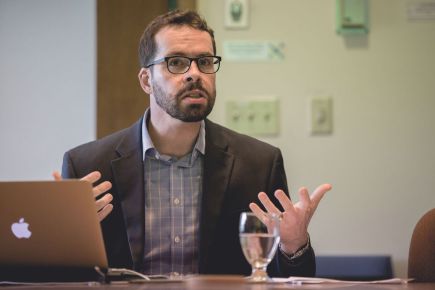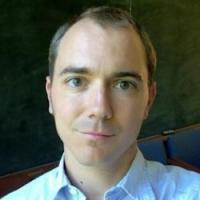
“Humanists’ account of search—what it is and what it’s good for—has been misguided, limited, and limiting. Search tools allow us to study an expanded range of signs.”
Imagine a literary scholar 200 years from now, if such a person still exists, if civilization still exists. Combing textual archives from our current era, this researcher might find a spike in phrases in the form of “X is the new Y.”
Orange is the new black. 40 is the new 30. Snapchat is the new Facebook. Thursday is the new Friday. Donuts are the new cupcakes.
Our researcher might speculate on their meaning. She might note the irony and hyperbole involved, and wonder if these are means of coping with anxiety about the speed of technological change, or social change.
“Sitting is the new smoking” might reveal health concerns about sedentary lifestyles.
“Coffee is the new wine” might reveal consumer trends about artisanal goods.
“Rob Manfred is the new commissioner of baseball,” would be a false match—she would have to filter out sentences that share the structure but not the meaning.
“Protest is the new brunch,” with its sudden rise in 2017, might signal a significant political shift.
Together, these searches would offer cultural insight through readily available tools and a particular attention to language, according to literary scholar Daniel Shore, who presented this scenario in a May 18 lecture at the University of Washington, organized by the Textual Studies Program.
Shore, Provost's Distinguished Associate Professor of English at Georgetown University, has developed a method of using textual searches to map what he call “syntactic events”—instances when a particular phrase reveals something larger about a historical moment. He is working on a book, Cyberformalism, under contract with Johns Hopkins University Press, that includes a chapter on the phrase “Act as if.” Shore traces the phrase from Pascal’s Wager about acting as if God exists to Ben Affleck in Boiler Room (2000): “Act as if you are the [bleeping] president of this firm.”

(Courtesy Zezhou Jing/The UW Daily)
In another article, Shore tracks the history of the evangelical phrase “WWJD?” (What would Jesus do?). His “genealogy of a syntactic form,” published in Critical Inquiry in 2010, traces the history of the ethical question back to its origins in the 17th century. Before then, devotional teaching focused on imitating what Jesus did in his historical life (imitatio Christi). By 1631, the world had changed so much that it became necessary for believers to speculate about what Jesus would do. The first use of the WWJD question, by Presbyterian preacher Edward Reynolds, marks a decisive development in the modern era, Shore says.
“[WWJD] imaginatively bridges the historical gap between the life of Jesus and the lives of his followers, allowing his example to serve as a guide even in a radically changed world,” he writes.
Shore framed his talk as a defense of search from a variety of detractors. Popular authors like Nicholas Carr argue that Google is “making us stupid” or “shallow.” Prominent scholars like Gayatri Spivak have suggested that digital search ruins the possibility of serendipitous discoveries by offering “the effect of research very quickly without the effort of research.”
“Nothing is accidental anymore because the connections are all already made for you,” Spivak said in a 2010 PMLA interview. “For an aesthetic education, it is better to do as we often used to do, to wander in library stacks, because you would see things that you hadn’t thought about before.”
Shore argued that the right kind of searching can open new avenues that other methods overlook.
“Humanists’ account of search—what it is and what it’s good for—has been misguided, limited, and limiting,” he said, speaking at the Simpson Center for the Humanities. “Search tools allow us to study an expanded range of signs.”
His exercises share a focus on colloquial phrases or sentences. Too often, said Shore, scholars treat language as a collection of individual words, a habit encouraged by tools like dictionaries and concordances. But idiomatic phrases can reveal even more about cultural attitudes.
“We think with and through tools,” Shore said. “They change what it’s possible to do. Our questions and our tools are not entirely separate.”
Shore visited in connection with the UW Graduate Certificate in Textual & Digital Studies, which goes beyond studying texts on the page (or screen) to consider how text is produced, distributed, bought and sold, preserved, and suppressed; how it moves through the world.
Jeffrey Todd Knight, Associate Professor of English and Co-director of the Textual Studies Program, introduced Shore by suggesting that literary studies are stuck in a “crisis of scale” between close reading (reading one book at a time) and distant reading—the quantitative analysis of vast bodies of text by digital humanists like Franco Moretti and Ted Underwood.
“These two methods tend to meet in a sort of cliché that we need to do both,” Knight said. “But very few people have worked out how to do both. Daniel has worked out a sort of digital-humanities formalism that operates at the level of the sentence or the phrase, and how those phrasal forms move through time.”
Shore has drawn on the field of corpus linguistics in a way that few digital humanists do, Knight said. That’s allowed him to range over vast periods of time.
“Dan is an old-school humanist,” Knight said. “He’s a classically trained scholar of language who is just as comfortable in ancient culture and the Renaissance as he is in the present. He has a fluidity of movement that I think is really enviable.”
Shore’s method of search is also less complicated than large-scale forms of distant reading. His “orange is the new black” exercise could be conducted on Google with the search string “* is the new *”. In a tagged corpus like the NOW (News on the Web) Corpus, searching for "_N* is the new _N*", would deliver only nouns. Adding "(is|are)" for the verb would catch plural uses as well.
These sorts of regular expression searches can be learned in an hour or two, Shore said. Doing so can open a wealth of potential data for scholars with the skills to explore it.
“For the great majority of scholars, a search engine offers little more than a glorified index,” Shore writes in Critical Inquiry. “But this limitation lies in thought, not technology.”
Shore’s visit was part of the Histories and Futures of Publication lecture series. It was sponsored by the Simpson Center for the Humanities, the Textual Studies Program, UW Libraries, the Information School, Modern Language Quarterly, and the departments of Classics, Comparative Literature, Cinema & Media, English, and French & Italian Studies.
